
 Flash News
Flash News
The prosecution sends 5 Kosovar citizens to trial for drug smuggling
21-year-old injured with knife in Saranda
Gunfire in Kavaja, shot at a married couple
Interventions in Spaç prison, Ministry of Culture reacts: We do not intend to modify history
Accident on the new Kukes bridge, three vehicles collide
The Economist: The US economy has overshadowed other rich countries

Expect this to continue, argue The Economist's Simon Rabinovitch and Henry Curr.
"If current policies and progress continue, the United States will have slower growth than other major industrial nations for the foreseeable future."
So declared the Competition Policy Council, a committee advising the US president and Congress, in 1992, at a time when America was gripped by concerns that the economy was declining and losing ground to Japan and Europe.
The opposite turned out to be true. Japan entered a long period of stagnation, Europe's growth slowed, and America experienced a mini-boom, fueled by the rise of the Internet. More than three decades later, some analysts still envision a US economy headed for decline. Now China is the new concern in the East.
Instead of Bill Clinton, it's presidential candidate Donald Trump who complains about the state of the economy (Trump says the economy is "failing," while Clinton called it an "uncomfortable economy, stuck somewhere between Germany and Sri Lanka") .
Ordinary Americans are worried. The Gallup poll regularly asks Americans if they are satisfied with the way things are going. From 1980 to the early 2000s, just over 40% said they were satisfied. Over the past two decades, this figure has dropped to 25%.
Will the prophets of economic decline be right this time?
Since the 1990s, the US economy has experienced occasional turmoil, including the dot-com bust, the global financial crisis, a spike in unemployment during the Covid-19 pandemic, and more recently, a spike in inflation. In purchasing power parity (PPP) terms, America's share of the global economy has shrunk, from 21% in 1990 to 16% now.
But one phenomenon has been consistent since the early 1990s: America has grown faster than other big rich nations and bounced back stronger from setbacks along the way. The misdiagnosis of the competition council in 1992 should serve as a lesson for today's pessimists.
Since that erroneous prediction, America's growth has outperformed other rich nations, and its strengths today are good reason to be optimistic about the country's economic strength and potential. The reason why America's share of global GDP has decreased has nothing to do with America itself, but with the growth of the world's two most populous countries, China and India. However, China's per capita output is still less than a third of America's; India's is even smaller.
Even more surprising is how America has outperformed its developed counterparts. In 1990, America accounted for about two-fifths of the total GDP of the G7 developed countries; today it accounts for half (see chart).
Per capita, American economic output is now about 40% higher than in Western Europe and Canada, and 60% higher than in Japan. Average wages in America's poorest state, Mississippi, are higher than average wages in Britain, Canada and Germany. America's momentum has accelerated recently. Since the beginning of 2020, shortly before the Covid-19 pandemic, America's real growth has been 10%, three times the average of the other G7 countries.
In the G20 group, which includes major developing countries, America is the only country whose output and employment are above pre-pandemic expectations, according to the International Monetary Fund. The combination of this economic growth with the strength of the Dollar translates into weight for America and wealth for Americans. This can be seen in the large number of Americans traveling and spending record amounts overseas.
A decade ago (while Chinese travelers were also flaunting their wealth), many analysts thought China would overtake America as the world's largest economy. Instead, China's GDP has recently fallen, from about 75% of America's in 2021 to 65% now.
One reason why American growth has been so strong for so long, and why it can be expected to continue, has to do with geography. As a quasi-continental economy with a giant consumer market, American companies benefit from economies of scale: in short, a good idea created in California or a product built in Michigan can spread to 49 other states.
America also has a large, well-integrated labor market, allowing people to get better-paying jobs, drawing workers into more productive sectors. A long southern border may cause political controversy, but it has been an economic boon, allowing the labor force to grow steadily and helping to fill the hard, dirty jobs that many native-born Americans , they have no interest in doing them.
And just as important as the size of the country is what lies beneath it. Over the past two decades, improvements in techniques for extracting hydrocarbons from once impenetrable shale rocks have turned America into the world's largest producer of oil and gas.
The US economy also has strengths that make it a country with potential. Having access to the world's deepest financial markets has made it easier for startup firms to raise capital, a better way to get off the ground than borrowing cash.
The abundance of new companies with potential, on the other hand, has increased the alluring effect of the US markets. Similarly, since the dollar is the world's dominant currency, American businesses enjoy frictionless global trade. And America has the best universities in the world, which attract the best students in the world.
The new policies undertaken have also helped. America has a more relaxed approach than many other countries to business regulatory laws. This has given high-tech companies room to maneuver and grow. But America's success is not just about little government intervention in the economy. Officials have made bold and decisive interventions during crises.
After a shaky start, America mounted a strong response to the global financial crisis of 2007-09, acting decisively to clean up bank balance sheets and using tight monetary policy to support economic growth.
The government's response to the economic slowdown during Covid-19 was even more remarkable, with a series of fiscal stimulus packages unmatched by other countries. Officials went a bit overboard in the recovery effort, contributing to the global rise in inflation.
But it's impossible to explain America's powerful economic engine without acknowledging the government's willingness to step on the gas pedal when necessary. However, despite its economic strength, America has many flaws. A key test of any country's governance is whether its people live well and long. At this point, America leaves much to be desired.
In 2023, life expectancy for an American newborn was 79 years, three years shorter than the average in Western Europe, according to UN projections. This gap did not exist in 1980. It is largely a reflection of the high level of obesity and acute American problems such as drugs, guns and unsafe streets. But older Americans are worse off, even in relative terms. In 2023, in America, a 60-year-old was expected to live an average of 24 more years, almost a year less than in Europe.
In 1980, it was the opposite; Older Americans lived longer than their European peers, by nearly a year. Many critics of America's economic model say it is riddled with flaws. They complain that there is extreme inequality and that increasingly dominant companies are squeezing competitors.
But these claims inflate the reality. It is true that there may be room for a more equitable distribution of the nation's wealth without harming America's growth, but the widely held belief that the richest 1% of the population is getting all the resources is overblown. As for tech giants like Apple and Amazon, their market dominance may be limited through certain policies, but it is also true that they have created great value in everyday life and transformed industries.
And they are facing tough competition to stay on top. These companies are actually more a testament to America's economic success than to its problems. In the history of the modern economy, America's three-decade performance is remarkable. Can it continue? Some pessimists point to toxic policies, to fiscal weaknesses. Optimists praise a country with a relentless dynamism that pushes it forward./ Monitor
Latest news



How did the feud between Donald Trump and Elon Musk start?
2025-06-06 11:52:32
The prosecution sends 5 Kosovar citizens to trial for drug smuggling
2025-06-06 11:33:56
21-year-old injured with knife in Saranda
2025-06-06 11:24:10
Kosovo citizens flock to the Albanian coast, long queue from Morina
2025-06-06 11:11:07
Gunfire in Kavaja, shot at a married couple
2025-06-06 11:05:01
Merz: Bashkëpunim i ngushtë Gjermani-SHBA
2025-06-06 10:45:35
A marijuana plantation is found in Cakran, a 24-year-old man is arrested
2025-06-06 10:25:53
Gianni De Biasi shows the formula for how we can win against Serbia
2025-06-06 10:08:57
Hoxha: The CEC was one of the main architects of the destruction of free voting
2025-06-06 09:52:16
Foreign exchange, June 6, 2025
2025-06-06 09:33:01


Accident on the new Kukes bridge, three vehicles collide
2025-06-06 08:43:06
Horoscope, what do the stars have in store for you today?
2025-06-06 08:28:14
Clear weather with few clouds, the forecast for this Friday
2025-06-06 08:13:54

Morning Post/ In 2 lines: What mattered yesterday in Albania
2025-06-06 07:46:29
In trial for tender abuse, socialist MP targets ILD
2025-06-05 22:37:09
Tabaku: The left in Albania has shown with facts that it is against integration
2025-06-05 22:09:44

Uzbekistan qualifies for the World Cup for the first time
2025-06-05 21:14:35
Index: Albania among countries that consistently violate workers' rights
2025-06-05 20:53:35
Accident in Burrel, two vehicles collide, 6 injured
2025-06-05 20:31:27
Discover foods that help you relieve stress
2025-06-05 20:16:34
Kalaja: I have a video where votes were taken from the DP and given to the PS
2025-06-05 19:58:04


Berisha: The international community does not accept the farce
2025-06-05 18:57:18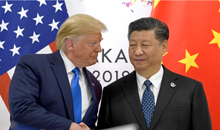
Trump after conversation with Xi: US and China will resume trade talks
2025-06-05 18:35:36
Berisha on May 11: 28 MPs were under the patronage of drug cartels
2025-06-05 18:15:44
The session in the Assembly closes, the majority approves the draft laws alone
2025-06-05 17:55:21
Kurban Bajrami, kreu i Komunitetit Mysliman të Shqipërisë uron besimtarët
2025-06-05 17:29:17

Media at OSCE conference: Organized crime has captured the Albanian state
2025-06-05 16:50:41
Car hits 75-year-old man at white lines in Vlora
2025-06-05 16:42:48

Protest in Spaç, after restoration interventions
2025-06-05 16:27:49
Photo/ Concrete mixer falls into abyss in Ulëz, driver rushed to hospital
2025-06-05 16:15:15
May 11/ Këlliçi: There are attempts to influence the final OSCE-ODIHR report
2025-06-05 16:06:38
Immigration is emptying schools and universities
2025-06-05 15:53:38
Plague breaks out, Kosovo bans import of sheep and goats from Shkodra and Kukësi
2025-06-05 15:48:23
After Tirana, KAS also decides to open the ballot boxes in Dibër
2025-06-05 15:31:03
Tirana is "paralyzed" again, here are the roads that will be blocked tomorrow
2025-06-05 15:20:12



Serbia is coming to Albania tomorrow, here's where it will be accommodated
2025-06-05 14:24:43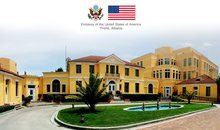
US Embassy updates visa appointment system: More flexibility for applicants
2025-06-05 14:21:01

Drug trafficking with "tentacles" in Europe, GJKKO seals prison for 9 arrested
2025-06-05 13:39:35
Deserting from the socialist ranks, Erion Braçe "becomes" a Democrat
2025-06-05 13:23:49
May 11 elections, KAS decides on a full recount of votes in Tirana
2025-06-05 13:22:28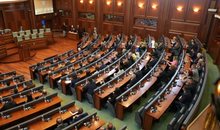

Clashes in the Parliament/ Elisa Spiropali expels Flamur Noka from the session
2025-06-05 13:04:42
A Girl, Otherwise, A Boy
2025-06-05 12:57:30
Accident at the "Albchrome" factory in Elbasan, three people arrested
2025-06-05 12:54:40


Berisha: The law of farce is that the dictator's votes are always increasing
2025-06-05 12:19:16


The murder saga, Alibej: It started after I gave Talo Çela's location
2025-06-05 11:45:27

Muslims celebrate Eid al-Adha, KMSH announces where prayers will be held
2025-06-05 11:24:50
Bardhi: The EU delegation said that crime controlled the elections in Elbasan!
2025-06-05 11:16:51


Journalists were censored by Spiropali, AGSH: Fraud and institutional propaganda
2025-06-05 11:00:20
Noka-majority: The foundations of your power rest on the bought vote
2025-06-05 10:54:00
Analysis: Peace between Russia and Ukraine, further away than it seemed
2025-06-05 10:51:57

Serious in Austria/ 35-year-old Albanian dies at work
2025-06-05 10:21:00

They produced and sold cannabis, 2 brothers arrested
2025-06-05 09:50:30

Guard employee commits suicide with service weapon
2025-06-05 09:15:00
Accident in Fier/ Car collides with an agricultural vehicle, 3 people injured
2025-06-05 09:08:55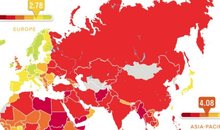


Parashikimi i motit për sot
2025-06-05 08:31:59
HOROSCOPE/ Here's what the stars have predicted for each sign
2025-06-05 08:16:17
Morning Post/ In 2 lines: What mattered yesterday in Albania
2025-06-05 07:52:36
Video/ Abin Kurti narrowly escapes, almost falling down the stairs
2025-06-04 22:54:08
The first case of small cattle plague in the country is confirmed
2025-06-04 22:36:54

Blushi: The person who kidnapped Meta became police chief
2025-06-04 21:45:24
"Fraud" with the forgiveness of State Police fines!
2025-06-04 21:15:22



"The real reason why young Albanians like me are coming to the UK illegally"
2025-06-04 20:07:39
Government opens a legal path for investments in Army properties
2025-06-04 19:49:25
Elderly woman forgets stove on, house burns down in Vlora
2025-06-04 19:46:42
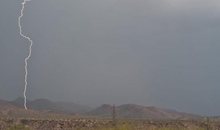
Ersekë/ Elderly man struck by lightning, dies on the spot
2025-06-04 19:12:55
Trump calls Putin, warns Ukraine that Russia will respond to attack on airbases
2025-06-04 19:05:56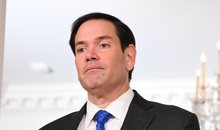
Zelensky's Chief of Staff Meets with Secretary Rubio in Washington
2025-06-04 18:53:37
